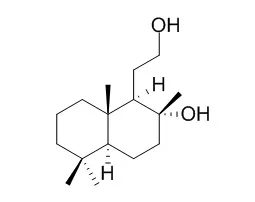| Description: |
Sclareol glycol (SG) behaves as an anxiogenic, memory-facilitator and perhaps adaptogenic agent, the effects of SG may be mediated by different mechanisms of action (stimulation of adenylate cyclase, interaction with GABA-ergic and dopaminergic transmitter mechanisms). SG induces changes in core body temperature by interacting with dopamine (DA) receptors and with the second messenger system of 3',5'-AMP in the brain thermoregulatory areas. |
| Targets: |
Dopamine Receptor | GABA Receptor |
| In vitro: |
| Eksp Med Morfol. 1989;28(3):1-7. | | Study of the effect of sclareol glycol diterpene on the 3',5'-AMP level.[Pubmed: 2553391] | Sclareol glycol (SG) is a semisynthetic diterpene of the labdanic group. SG is tetranorlabdaniol bivalent alcohol 13, 14, 15, 16-tetranorlabdan-8 alpha, 12-diol, obtained from the plant Salvia sclarea L., grown in Bulgaria.
CONCLUSIONS:
The effects of SG were studied on the level of 3',5'-AMP in:mono-layer tissue cultures of the anterior hypophysis of the rat; in hypophysial and brain tissue during in vitro incubation; in liver microsomes of the rat during in vitro incubation and in liver perfusate of the rat. It was established that SG induced an increase in accumulation of 3,5'-AMP in the tissues from the anterior hypophyses of mature and newborn rats, in the sections of brain cortex and cerebellum of mature rats. Similar changes were found by the diterpene forskolin, studied comparatively. SG induced a reduction of accumulation of 3',5'-AMP in liver microsomes and diminished the release of 3',5'-AMP in a liver perfusate of the rat.
CONCLUSIONS:
The increased accumulation of 3',5'-AMP due to SG could be explained by postreceptor stimulation of the enzyme adenylate cyclase, binding directly to its catalytic subunit. The reduced accumulation of 3',5'-AMP in liver microsomes and its diminished release in liver perfusate could be explained either by activation of the inhibitory adenylate cyclase in hepatocytes or by desensitisation of 3',5'-AMP-generating system. |
|
| In vivo: |
| Gen Pharmacol. 1991;22(2):331-5. | | Influences of diterpene sclareol glycol on some dopamine related behavior.[Pubmed: 2055429] |
1. The effects of the diterpene Sclareol glycol (SG) of the labdane family on some dopamine (DA) related behavior (locomotor activity in mice, apomorphine-induced stereotypy in mice and rats, and haloperidol-induced catalepsy in rats) were studied.
METHODS AND RESULTS:
2. The locomotion frequency of mice was significantly increased by SG (stronger effect by low and medium dose). SG antagonized the hypomotility induced by reserpine pretreatment. SG enhanced the apomorphine decreased motility (induced by small dose of apomorphine). 3. SG provoked increase of apomorphine stereotypy. The long-term SG treatment augmented the sensitivity of rats to apomorphine-induced stereotypy. 4. SG at low dose decreased haloperidol-induced catalepsy: at higher dose it increased the catalepsy. SG treatment alone did not induce catalepsy.
CONCLUSIONS:
5. These results were discussed in the light of a possible interaction of SG with dopaminergic transmission (DA autoreceptors and postsynaptic DA receptors) at the level of the striatum and the nucleus accumbens. The interaction of SG with adenylate cyclase (stimulation of catalytic subunit) and with GABAergic transmission in realization of its effects on DA related behavior was also discussed. | | Pharmacol Biochem Behav. 1989 Nov;34(3):503-5. | | Diterpene sclareol glycol inhibits clonidine-induced aggressive responses in mice.[Pubmed: 2623007] |
METHODS AND RESULTS:
The effects of a reversible activator of adenylate cyclase Sclareol glycol (SG), a semisynthetic diterpene of the labdane family, on the aggressive behavior induced by a high dose of clonidine in mice were studied. SG was applied at doses well below the lethal dose. Aggressive behavior induced by clonidine at a dose of 30 mg/kg IP was decreased in a dose-dependent manner by SG (1, 5, 25 mg/kg IP). The aggressive responses were abolished by doses of 50 and 100 mg/kg.
CONCLUSIONS:
It is suggested that the inhibitory effects of SG on clonidine-induced aggressive behavior are realized mainly via its effect on adenylate cyclase and perhaps involving synaptic transmitter action. |
|






 Cell. 2018 Jan 11;172(1-2):249-261.e12. doi: 10.1016/j.cell.2017.12.019.IF=36.216(2019)
Cell. 2018 Jan 11;172(1-2):249-261.e12. doi: 10.1016/j.cell.2017.12.019.IF=36.216(2019) Cell Metab. 2020 Mar 3;31(3):534-548.e5. doi: 10.1016/j.cmet.2020.01.002.IF=22.415(2019)
Cell Metab. 2020 Mar 3;31(3):534-548.e5. doi: 10.1016/j.cmet.2020.01.002.IF=22.415(2019) Mol Cell. 2017 Nov 16;68(4):673-685.e6. doi: 10.1016/j.molcel.2017.10.022.IF=14.548(2019)
Mol Cell. 2017 Nov 16;68(4):673-685.e6. doi: 10.1016/j.molcel.2017.10.022.IF=14.548(2019)